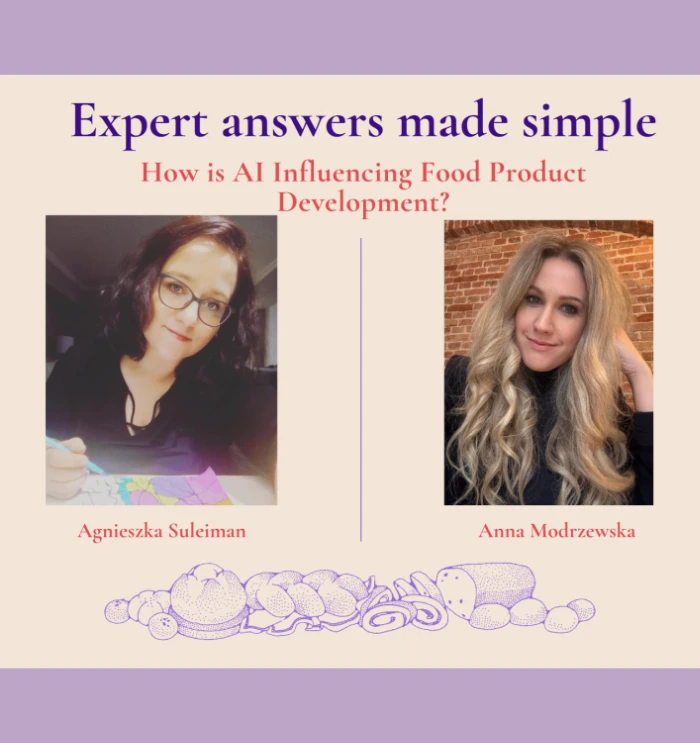Homepage » Episode #9 How is AI influencing Food Product Development?
3 Questions to the Expert and 3 answers that explain complex phenomena in a simple way.
Years ago I had the pleasure of meeting Agnes Suleiman, Ph.D., and I instantly became one of her biggest admirers. Not only does she possess a fantastic sense of humor, but above all, she’s a genuine scientist who puts knowledge into practice – something far too rare in the world of research. Therefore I strongly invite you to read “3 Questions to the Expert” and 3 answers that explain complex phenomena in a simple way. Episode #9 How AI is influencing Food Product Development with Agnes Suleiman, Ph.D. as main super expert.
Anna Modrzewska: What is product development based on in the food industry and what are new trends for the next 5 years?
Agnieszka Suleiman: the food industry, consumer demand, technological advances, sustainability efforts, and regulatory changes heavily drive product development. The new trends shaping the industry today are as follows:
Health and Wellness, with growing focus on functional foods—products that not only satisfy hunger but also promote health. This includes ingredients that boost immunity, improve gut health, or enhance mental clarity, such as ashwagandha, matcha green tea or turmeric.
Plant-Based and Alternative proteins, food products are rapidly expanding, not just in the vegetarian and vegan markets, but also for flexitarians (people who are not strictly vegetarian but reduce meat consumption). There is a significant shift toward plant-based meats, dairy alternatives, and even plant-based seafood. We are talking here mushroom proteins (ex. Reishi), crickets flour, pumpkin seed protein powder, hemp protein powder etc.
Clean Label and Transparency are more and more in demand by customers in product ingredients. Clean label trends focus on simplicity, with fewer artificial additives and preservatives. The rise of “made with real ingredients” is critical for brand loyalty.
Convenience and On-the-Go Options in busy lifestyles continue to demand convenient meal solutions, but there is a shift toward healthier, high-quality on-the-go products. Ready-to-eat meals, snacks, and beverages that require minimal prep are already in high demand.
Cultural and Global Flavors are booming, since consumers become more adventurous and showing increased appetite for global cuisines and bold flavors. Products incorporating spices, herbs, and cooking techniques from diverse regions—like African, Latin American, and Southeast Asian—are increasingly popular.
Anna Modrzewska: How is AI influencing Food Product Development?
Agnieszka Suleiman: AI tools can analyze vast amounts of data from social media, reviews, online forums, and surveys to identify emerging food trends, consumer preferences, and evolving dietary needs. This enables developers to stay ahead of the market and create products that cater to changing tastes and demands. AI can forecast the popularity of ingredients, flavors, and health trends, allowing developers to design products that align with future consumer expectations. Online tools can predict how ingredient combinations will affect flavor and texture. For example, it can suggest how different levels of sweetness, acidity, and saltiness might combine to create a more desirable taste. AI models can also optimize texture, ensuring consistency across large batches. AI tools can simulate sensory experiences based on ingredient characteristics to predict consumer reactions to flavor and texture before the product hits the market. AI accelerates the development cycle by simulating, testing, and optimizing formulations virtually. This reduces the time required for prototyping and allows developers to test quickly multiple iterations of a product without needing to produce each one. I am using the formulation program software for some sensory and customer survey testing in my day to day work with product development, especially if I need to pull insights from various sectors (like pharmaceuticals or cosmetics) to apply novel formulations and innovations to the food industry.
Anna Modrzewska: How product developers can utilize AI-based tools for formulation?
Agnieszka Suleiman: As a researcher and product developer, I can use AI tools to discover novel ingredient combinations that can enhance the nutritional value, taste, or texture of a product. For instance, tools like IBM’s Watson or Flavor Studio software can recommend ingredients that match specific flavor profiles, helping developers create innovative foods. For me AI is suggesting the most effective formulations for meeting specific health claims (e.g., high fiber, low sodium) by analyzing vast datasets on the properties of thousands of ingredients and their interactions.
Product developers can tap into AI-driven platforms that collect and analyze real-time consumer feedback from social media, surveys, and purchase data. This feedback helps shape product development, ensuring formulations align with consumer desires.
AI has significantly influenced food product development by enhancing efficiency, precision, and creativity across multiple stages of the process. AI-driven tools are helping companies not only streamline production but also make more informed decisions about product formulation, customization, and consumer preferences. Through AI-driven food R&D, customers can expect food that is more aligned with their needs, safer, and often more affordable—all while benefiting the sustainability goals.
